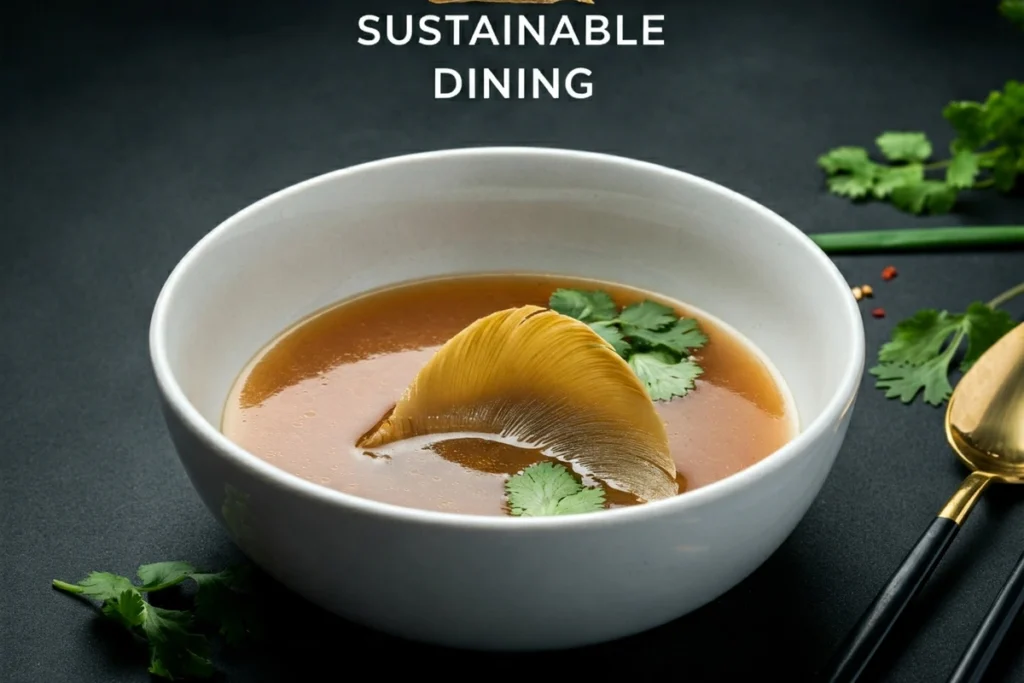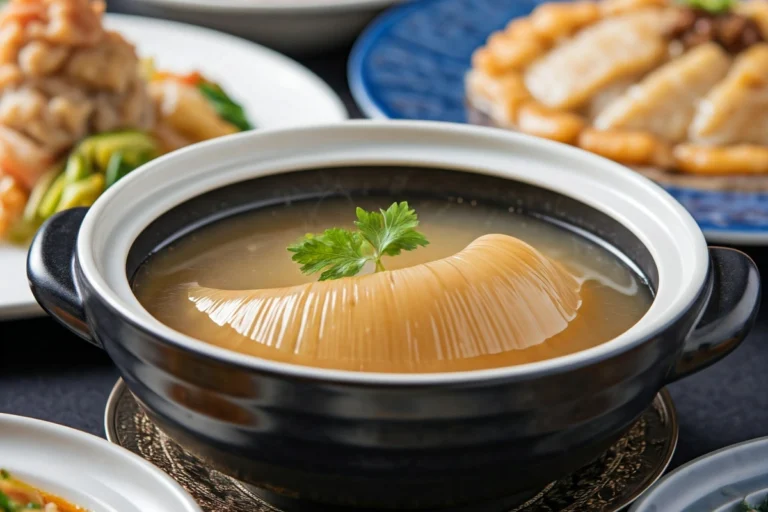Introduction
Shark fin soup is one of the most controversial yet historically significant dishes in Chinese cuisine. For centuries, this delicacy has been more than just a culinary item—it’s been a symbol of wealth, status, and tradition. But why is shark fin soup popular in Chinese culture, and how did it gain such prominence? To answer this, we need to explore its origins, cultural significance, and the myths surrounding its consumption.
In this article, we’ll delve into the history of shark fin soup, uncover its symbolic importance, and discuss its environmental and ethical implications. By the end, you’ll gain a deeper understanding of why this dish holds such a revered place in Chinese tradition—and why it’s becoming increasingly controversial.
The History of Shark Fin Soup
Origins During the Ming Dynasty
Shark fin soup traces its roots back to the Ming Dynasty (1368–1644), a time when it was first introduced as a luxury food item. During this era, emperors and the elite sought dishes that showcased both culinary artistry and exclusivity. Shark fin, with its unique texture and rarity, quickly became a prized ingredient.
Known as one of the “big four” seafood delicacies—alongside abalone, sea cucumber, and fish maw—shark fin was often served at imperial banquets to impress guests. Its association with royalty and affluence helped cement its status as a dish “fit for an emperor.”
The “Big Four” of Chinese Culinary Delicacies
The inclusion of shark fin in the “big four” of Chinese seafood delicacies highlights its cultural importance. These ingredients weren’t just food; they were symbols of prosperity and high social standing. Each of these items required meticulous preparation and was reserved for special occasions, further elevating their allure.
While shark fin soup began as an imperial indulgence, its popularity gradually trickled down to wealthy merchants and officials, eventually becoming a staple at significant celebrations like weddings and banquets. This historical legacy still influences its perception today, making it a dish associated with tradition and status.
Cultural Significance of Shark Fin Soup
Symbol of Prestige and Status
Why is shark fin soup popular in Chinese culture? One key reason lies in its deep-rooted association with prestige and status. For centuries, serving shark fin soup at banquets or celebrations was a way to signal wealth and success. Reserved initially for emperors and the elite, it was seen as a culinary indulgence that only the privileged could afford.
As China’s economy grew, shark fin soup became more accessible, transforming from an imperial delicacy into a sought-after dish for weddings, business dinners, and other significant events. The tradition of serving this dish at such occasions persists because it reflects prosperity and respect for guests.
“Fit for an Emperor” – Culinary Traditions
The phrase “fit for an emperor” aptly describes the historical importance of shark fin soup in Chinese culture. Its inclusion in the “big four” seafood delicacies—alongside abalone, sea cucumber, and fish maw—solidified its role as a symbol of culinary luxury. The meticulous preparation required for the dish further emphasizes its exclusivity.
Today, despite growing awareness of the environmental impact of shark finning, shark fin soup remains an enduring symbol of tradition. Its prestige, rooted in history, continues to influence perceptions of this controversial dish.
Internal Link Opportunity: Discover the rich history of celebratory dishes like Chicken Tetrazzini, another example of food tied to tradition.
Medicinal Myths and Beliefs
Perceived Health Benefits
Many believe shark fin soup offers health benefits, a notion that adds to its allure. In traditional Chinese medicine, shark fins are thought to improve vitality, boost energy, and even enhance skin health. These perceived benefits, passed down through generations, have contributed to the dish’s popularity.
However, these claims lack scientific support. Modern research reveals that shark fins contain high levels of mercury, posing significant health risks when consumed in large quantities. Despite this, the myth of shark fin’s medicinal properties continues to influence its cultural significance.
Scientific Reality: Health Risks of Consumption
Contrary to popular belief, shark fin consumption can be harmful. Mercury poisoning, a serious health issue, is a risk due to sharks’ position at the top of the food chain. The longer a shark lives, the more mercury it accumulates, making its fins a hazardous ingredient.
Moreover, shark fins themselves are flavorless, relying on the broth for taste. This raises the question: Is the perceived prestige worth the potential risks? For many, tradition and status still outweigh concerns, perpetuating the demand for this contentious delicacy.
The Role of Economy and Accessibility
Impact of Rising Incomes in China
One major factor in answering why is shark fin soup popular in Chinese culture is the nation’s economic growth. Over the past few decades, as incomes have risen, so has the demand for luxurious items, including shark fin soup. What was once exclusive to emperors and the elite has now become a status symbol for the growing middle class.
In modern times, serving shark fin soup at significant events like weddings or business banquets reflects success and prosperity. As more people gained access to the dish, its symbolic value persisted, even as awareness of its environmental costs increased.
From Exclusive to Mainstream
Shark fin soup transitioned from an exclusive delicacy to a more accessible luxury item as supply chains expanded. Advances in transportation and global trade made it easier to source shark fins, meeting the rising demand. However, this accessibility also led to increased environmental exploitation, intensifying the controversy surrounding the dish.
For those exploring other celebratory dishes steeped in tradition, check out our guide to unique festive recipes like Pineapple Casserole.
Controversy and Environmental Impact
The Devastating Practice of Shark Finning
The controversy surrounding shark fin soup is inseparable from the environmental harm caused by shark finning. Each year, millions of sharks are killed, often with their fins removed while they are still alive. This inhumane practice not only raises ethical concerns but also threatens marine biodiversity.
Sharks are apex predators, meaning their role in the food chain is critical to maintaining balance in marine ecosystems. Removing large numbers of sharks disrupts this balance, leading to overpopulation of certain species and the depletion of others.
The Role of Sharks in Marine Ecosystems
Sharks play an essential role in controlling populations of fish and other marine life, ensuring the health of coral reefs and seagrass beds. Their absence can lead to cascading effects that harm both marine and human communities, including those that depend on fishing industries.
Organizations and activists continue to campaign against the consumption of shark fin soup to address these environmental concerns. By highlighting the ecological consequences, they hope to shift perceptions and reduce demand for the dish.

If you’d like to learn about other dishes that balance tradition with sustainability, explore recipes like Creative Ways to Use Leftovers.
Modern Movements Against Shark Fin Soup
Bans and Policies in China
In recent years, growing awareness of the environmental impact of shark fin soup has prompted significant changes. The Chinese government has taken steps to curb the dish’s consumption, starting with a 2013 ban on serving shark fin soup at official government banquets. This move signaled a shift in attitudes, encouraging others to reconsider the dish’s place in modern culture.
Efforts to answer why is shark fin soup popular in Chinese culture now often include discussions about sustainability and ethical dining. Government regulations, combined with growing advocacy from environmental groups, have led to a decline in shark fin imports and consumption in some regions.
Celebrity Campaigns and Advocacy
Celebrities have played a crucial role in reducing demand for shark fin soup. Prominent figures like Yao Ming, the former NBA star, have lent their voices to public campaigns highlighting the damage caused by shark finning. Through impactful ads and documentaries, these campaigns aim to shift public perception and encourage alternative dishes.
Organizations like WildAid have reported progress, with shark fin prices dropping and demand falling by nearly 80% in major Chinese cities. These changes illustrate how advocacy and education can reshape cultural practices, even those as deeply rooted as serving shark fin soup.
Culinary Alternatives and Changing Trends
Substitute Ingredients for Shark Fin Soup
As attitudes shift, chefs have developed creative alternatives to traditional shark fin soup. Ingredients like vermicelli, jellyfish, and even plant-based gels mimic the texture of shark fin, allowing people to enjoy the dish without the ethical concerns. These substitutes are gaining popularity in high-end restaurants and among home cooks alike.
For those who still wonder why is shark fin soup popular in Chinese culture, these alternatives offer a way to honor tradition while embracing sustainability. By focusing on flavor and presentation, chefs can preserve the celebratory spirit of the dish without harming marine ecosystems.
Declining Popularity and Changing Perspectives
The demand for shark fin soup is steadily declining, thanks to awareness campaigns and changing societal values. Younger generations are more likely to prioritize sustainability, often choosing eco-friendly alternatives at events and gatherings.
This shift reflects a broader trend: balancing tradition with modern values. While shark fin soup remains symbolic of status and prestige, it’s no longer as widely accepted or necessary to convey these ideals. As perspectives evolve, this dish may one day become a relic of the past.

Ethical Considerations and Public Awareness
The Price of Tradition
Shark fin soup’s connection to Chinese culture runs deep, but its production comes at a high ethical cost. As we examine why is shark fin soup popular in Chinese culture, it’s impossible to ignore the moral dilemmas tied to its consumption. Sharks are often killed in cruel ways, with their fins harvested while the rest of the animal is discarded. This practice is not only inhumane but also unsustainable, threatening marine ecosystems and species survival.
While some argue that traditions must be preserved, others question whether maintaining these customs justifies the environmental and ethical harm. As these debates gain traction, consumers are becoming more mindful of the consequences of their choices.
Spreading Awareness Among Younger Generations
Education has played a significant role in reshaping views on shark fin soup. Schools, environmental campaigns, and social media have helped inform younger generations about the ecological impact of shark finning. These efforts highlight that traditions can evolve to reflect modern values.
By promoting alternatives and fostering open discussions, advocates hope to create a future where cultural pride is expressed without harming the planet. The question is no longer just why is shark fin soup popular in Chinese culture, but how that popularity can adapt to support ethical and sustainable practices.
FAQs About Shark Fin Soup
Why Is Shark Fin Soup Considered a Delicacy?
Shark fin soup has long symbolized prestige and wealth in Chinese culture. Its historical ties to imperial banquets and its reputation as one of the “big four” seafood delicacies made it a highly sought-after dish for celebrations and special occasions.
What Are the Environmental Consequences of Eating Shark Fin Soup?
The environmental cost of shark fin soup is immense. Shark finning practices result in the deaths of millions of sharks annually, disrupting marine ecosystems. Sharks are apex predators, and their decline can lead to imbalances that affect fish populations and coral reef health.
Are There Any Laws Banning Shark Fin Soup Globally?
Many countries have enacted laws banning shark finning or restricting the sale of shark fins. In China, government regulations have reduced the dish’s availability at official events. Similarly, advocacy groups have influenced bans in places like the United States and the European Union.
For more information on sustainable culinary choices, check out our guide to Creative Ways to Repurpose Leftovers.

